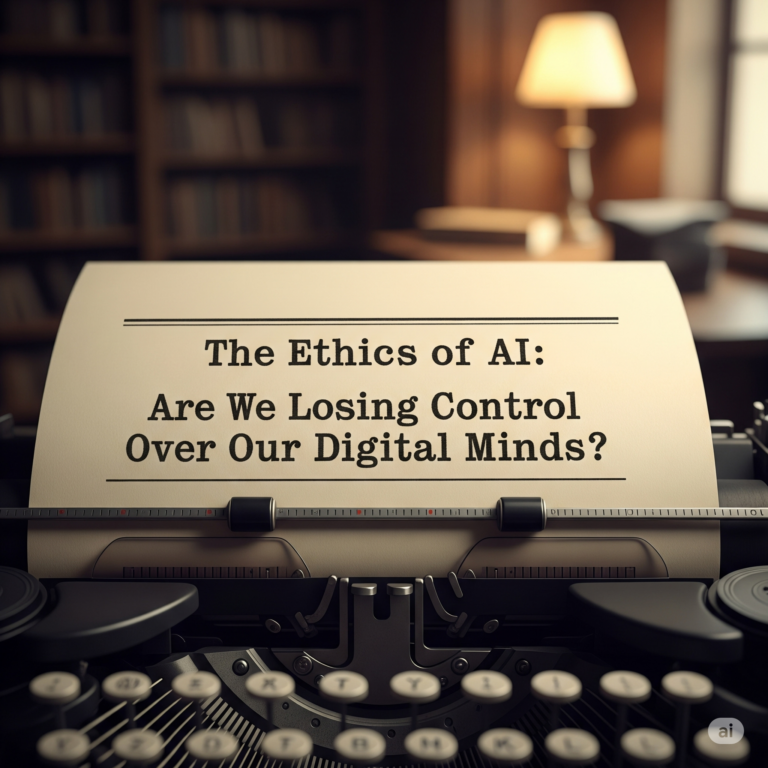- 🧠 The Ethics of AI: Are We Losing Control Over Our Digital Minds?
- 🧩 Introduction: AI Is Smarter — But Is It Fairer?
- 🔒 1. Privacy in the Age of All-Knowing Algorithms
- ⚖️ 2. Algorithmic Bias: When AI Learns Our Prejudices
- 🧠 3. Control: Are Humans Still in Charge?
- 🌐 4. Global Regulation: A Patchwork of Rules and Risks
- 💬 5. Can We Build Trustworthy AI? Yes — But It Won’t Be Easy
- ✅ Conclusion: Smart AI Is Not Enough — It Must Be Good AI
🧠 The Ethics of AI: Are We Losing Control Over Our Digital Minds?
🧩 Introduction: AI Is Smarter — But Is It Fairer?
Artificial Intelligence is now making decisions in places where it used to have no voice: hiring, policing, healthcare, credit approvals — even the news you read. But while the tech is getting smarter, the ethics behind it are getting messier.
As we race to develop faster and more powerful systems, one question looms:
Are we building intelligence that’s fair, private, and truly under human control — or something we might regret later?
🔒 1. Privacy in the Age of All-Knowing Algorithms
AI thrives on data. But to feed it, we’re giving up more personal information than ever — often without knowing it.
Your voice, your face, your medical records, your location history — it’s all being analyzed to “optimize” services. But at what cost?
🚨 Real risks:
- Facial recognition used without consent
- Smart devices always listening
- Health apps tracking sensitive data
- Deepfake threats and identity theft
📱 In 2025, AI can predict your mood, income, or future actions — but who controls that data, and who profits from it?
⚖️ 2. Algorithmic Bias: When AI Learns Our Prejudices
AI is only as “neutral” as the data it’s trained on. And guess what? Most of that data reflects human biases — past hiring decisions, criminal records, credit scores, and more.
🧪 Example:
An AI used in hiring rejected female candidates because it learned from a male-dominated dataset.
🛑 These aren’t rare glitches — they’re systemic problems:
- Racial bias in predictive policing
- Gender bias in hiring tools
- Economic bias in loan approvals
If not addressed, AI can automate inequality at scale, making unfair decisions look “scientific” and unquestionable.
🧠 3. Control: Are Humans Still in Charge?
As AI systems grow more complex, even their creators can’t always explain how they work. Welcome to the age of the “black box” AI.
🤖 Problem:
We don’t fully understand why an AI makes certain decisions — and yet we’re trusting it with life-or-death situations.
From autonomous weapons to stock trading algorithms, the line between human oversight and AI autonomy is getting dangerously blurry.
🚨 In 2025, governments are scrambling to create laws that ensure AI stays under human control — but tech moves faster than politics.
🌐 4. Global Regulation: A Patchwork of Rules and Risks
Some countries are pushing hard for ethical AI — others are prioritizing profit and power.
- The EU’s AI Act aims to ban high-risk systems like social scoring.
- The U.S. is investing in voluntary AI safety frameworks.
- China uses AI for surveillance and social management at scale.
🌍 Without global standards, we risk creating a fragmented future — where AI ethics depend on where you live.
💬 5. Can We Build Trustworthy AI? Yes — But It Won’t Be Easy
The good news? Experts are working on explainable AI, transparent models, and fairness audits. Tech companies are hiring ethicists and building “responsible AI” teams.
But real progress depends on:
- Better, more inclusive data
- Laws with teeth
- Public education
- Ongoing oversight
👥 Ethics in AI isn’t just a developer’s job — it’s society’s job.
✅ Conclusion: Smart AI Is Not Enough — It Must Be Good AI
We’re not just teaching machines to think — we’re teaching them how to think like us. That means every bias, shortcut, and blind spot we carry can be embedded into the very core of our digital future.
If we want AI that empowers people — not controls them — we must build it with ethics, transparency, and humanity at the center.
In a world run by algorithms, asking the right questions is more powerful than ever.


